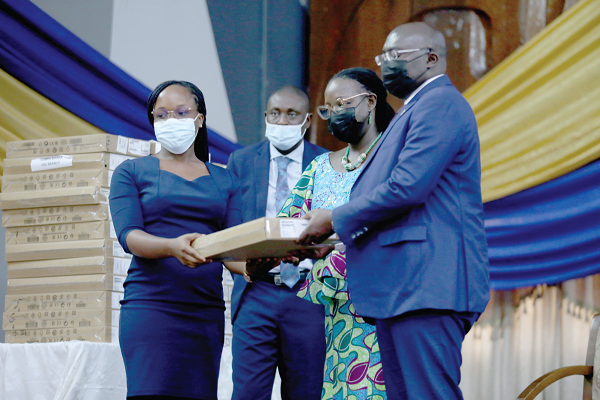
Bawumia supports One Laptop initiative
The Vice-President, Dr Mahamudu Bawumia, is supporting the University of Ghana with hundred laptops to augment the “One Student, One Laptop” initiative embarked upon by the university.
The project is the brainchild of the Vice-Chancellor, Prof. Professor Nana Aba Appiah Amfo, and is being spearheaded by the University of Ghana Business School (UGBS). It is expected to equip all students with.
Advertisement
Dr Bawumia was at the launch of the “One Student, One Laptop” project and a ceremony to reward 40 students who excelled in an essay competition organised by the school during which he said the vision of the university and the pursuit of digitalisation would help bridge the digital divide among students.
It will also complement the vision of President Nana Addo Dankwa Akufo-Addo that Ghana should transition from the "dependency mentality" to a "can do" attitude.
He expressed the hope that the laptop recipients would put the laptops they received to good use because the digital revolution was hinged on the youth.
Digital revolution
He said the digital revolution was youth-driven and, therefore, any initiative that would equip the youth to be functional in that regard and push the nation forward in technology and innovation was commendable.
“Our motivation in the pursuit of digital reforms, as part of our economic strategy, is simply because without it the nation would be stuck in a cycle of rhetoric and underdevelopment.
He further encouraged all alumni of the University of Ghana to throw their weight behind the initiative and also called on corporate bodies to support the university in its classroom modernisation project, which will upgrade lecture rooms with modern pedagogical facilities and strengthen the existing learning management systems.
Government interventions
Touching on some of the interventions of the government to introduce a digital revolution in schools across the country, Dr Bawumia mentioned the completion of infrastructure to provide free Wifi to 722 senior high schools, 46 Colleges of Education, 260 district education offices and an initial successful pilot of 13 public universities to enhance learning.
He said 88 per cent of all of Ghana’s fibre optic cable network, which he described as the backbone of wifi, had been laid in the past five years.
He added that the roll out of the "One-Teacher-One Laptop" programme which procured laptops for teachers at different levels of education enhanced teaching and provided a tool for developing the teacher's professional and personal capacity while bridging the technological gap between teachers in rural and urban areas.
Vice-President Bawumia said one of the lessons learnt as a country with the outbreak of the COVID-19 pandemic was the urgent need to innovate and leverage all the advantages that technology offered.
Dr Bawumia also assured the university authorities of the support of his office as they undertake a comprehensive digitalisation of all their processes this year to enable a team to be put together by the vice-chancellor to mobilise the expertise and resources for complete digitalisation at the university.
Vision
The Vice-Chancellor of the University of Ghana, Prof. Amfo, expressed delight about the initiative, saying it aligned with her vision and that of the government to increase access to online teaching and learning resources in the education sector.
She said the advent of COVID-19 led to the streamlining of the virtual mode of teaching and learning and that required students to have access to personal handheld smart devices.
She, therefore, described the initiative as timely and thoughtful, especially as it was targeted at the most vulnerable in the university community who could potentially be disadvantaged due to their inability to acquire such gadgets.
A Member of the Committee in charge of the “One Student One Laptop” project, Prof. Ernest Tweneboah Kodua, said he was hopeful that 1500 to 2000 laptops could be given out every academic year.




